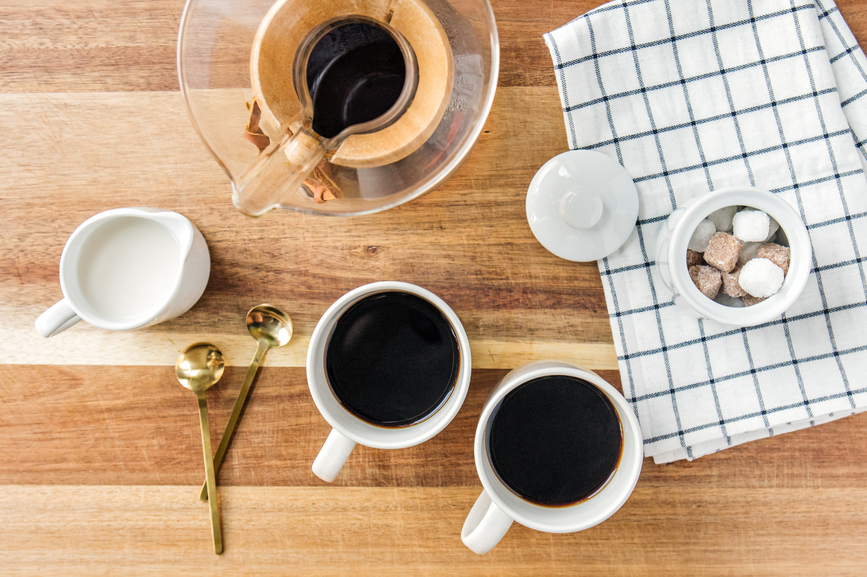“Great coffees will have a balance of flavors, including sweetness, acidity, and bitterness,” Han says. “A little bit of bitterness adds a level of complexity and depth that should be pleasant.” (Take, for instance, dark chocolate.) But there’s a fine line between pleasantly bitter coffee and a cup that makes you wince with every gulp.
- Jiyoon Han, coffee expert and co-owner and founder of Bean & Bean Coffee Roasters
- Makenzie Bryson Jackson, MS, food scientist and product development manager at Panaceutics
So… what if your home-brewed coffee frequently falls in the latter category? “Well, that’s obviously when we have a problem,” says Han.
The reason for overly-bitter coffee (or coffee that tastes off)
There can be a number of reasons why coffee might be overly bitter or just plain bad, but Han chalks it up to two main reasons. The first is that your roast might be too dark for your palate. “Dark-roasted coffee has essentially been burnt,” she says—and if you aren’t one of the people who like the bitterness of dark coffee, you might want to opt for a light- or medium-roast coffee to temper its bite.
The second reason is be that you may have over-extracted your coffee. “This can happen either by brewing with too much water, brewing with water that’s too hot, using coffee that’s too finely ground, or over-agitating the coffee grounds when brewing,” Han says. Conversely, you might also be under-extracting coffee, which can result in a flavor that is sour.
4 considerations to keep in mind to prevent bitter coffee
If you’ve already ruled out that the bitterness of your coffee isn’t because of the roast you’re using, but possibly because of under- or over-extraction, Han shares four considerations to keep in mind while making home-brewed coffee.
Are you using the right ratio of water to coffee?
First, it’s important to use the right ratio of water to coffee, says Han. If, for example, you’re using an automatic drip machine or pour-over brewer, she recommends using a 1:16 brewing ratio, “meaning for every gram of coffee, you’ll need to brew with 16 times that amount in water.”
Are you using the right temperature of water?
You’ll also want to ensure that water is just the right temperature. Han says you’ll typically want to set the brewing temperature somewhere in the range of 195°F to 205°F.
Food scientist and chef Makenzie Bryson Jackson, MS, also previously told Well+Good: “If the water is over 205°F, your coffee will be prone to over-extract and be bitter and harsh.” Conversely, she mentions that if water is under 195°F, it will be more difficult to extract, resulting in sour, flat-tasting coffee.
Are you using the ideal grind size for your brewing method?
Another thing you want to consider is using the ideal grind size for your brewing method. “Each method of coffee brewing requires a different optimal grind size,” says Han. “For example, the right grind size for an automatic drip machine could be too fine if you used that same grind for a French press.” She recommends starting with a medium to medium-fine grind (the grain should be anywhere between the size of kosher salt and table salt), and if you’re using a French press opting for a coarser grind.
Regardless of which at-home brewing method you use, Han suggests buying whole-bean coffee and grinding it just before use, which she says results in the best-tasting coffee. To get started, use a burr grinder to pulverize your beans. “A burr grinder is typically best for this,” Jackson told Well+Good, because it uniformly breaks the beans up.
That said, Han says that buying pre-ground coffee is okay, too—just as long as you know the grind size that you need.
Are you over–agitating your coffee grounds?
Depending on the method you use, you might have to “agitate” the coffee grounds, either by pouring water directly over them or swirling (or stirring) the coffee-ground mixture to extract their full flavor. However, as mentioned, it’s possible to over-agitate the coffee grounds. “You’ll need to be gentle in order to minimize agitation,” says Han, especially if you’re adding water manually—say, when using a pour-over brewer.
The simplest brewing method to prevent bitter coffee
While these are important considerations to keep in mind, if you’d rather sleepwalk through your morning coffee-making ritual (we see you!), you might want to opt to use a French press, which Han says is the simplest and most forgiving brewing method. “French presses generally use a coarser grind than other methods, so [beans] are harder to grind too fine,” she says. “Over-agitating is also not an issue since a French press brews by steeping.” The one-trade off to using a French press is that some people might not been keen on the “muddiness” of French press coffee.
If you’ve followed all these tips to a T and still end up with bitter coffee, don’t reach for more sweetener just yet. Instead, consider adding a tiny pinch of salt to your brew. Salt can make coffee taste less bitter by “neutralizing the bitter compounds in coffee and making it much more pleasant,” says Han. This is because salt binds to your tongue’s taste receptors and helps block the bitter compounds from binding to the bitter taste receptors.
Just be careful not to add too much salt, of course. “Otherwise you’ll end up with salty coffee in your hands,” says Han.
